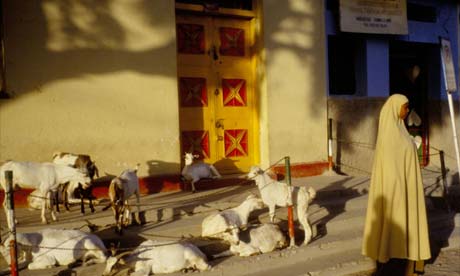fiogf49gjkf0d
Presenter Simon Reeve beats a track in Somaliland
Sunday, March 16, 2008

Road to nowhere ... goats in the capital of Samaliland. Photograph: Alamy
|
In a world where almost everywhere can be reached on a comfortable scheduled airline, there are still a few places so far off the beaten track they don't even appear on maps. Somaliland, in the chaotic Horn of Africa, is an oasis of democracy and order; a pro-Western Muslim country, keen to welcome foreign visitors: but officially it does not exist.
Despite the fact that it has democracy, peace, passports, traffic lights, universities, its own currency and some of the most inspiring people on the entire continent, no other country recognises Somaliland as a state. Map-makers identify it as part of lawless Somalia, and it exists in a legal limbo, like dozens of other unrecognised nations.
My journey through Somaliland took me from the capital to the southern border with Ethiopia, and back up to the remote northern coastline. But my trip started with a UN flight from Kenya into the Somali capital Mogadishu, perhaps the most dangerous place on the planet. Security there came in the form of a dozen heavily armed mercenary bodyguards, and in the main market I was able to buy a Somali diplomatic passport, in my own name, from a man called Mr Big Beard.
Arriving in Somaliland, after a two-hour flight from Mogadishu, was a complete contrast. The northern democracy has been peaceful for more than a decade. Uniformed officials stamped my passport (the British one), and I checked into the comfortable Ambassador Hotel in the capital Hargeisa, before heading out to explore with Yusuf, a local guide.
As we wandered along dusty streets, Yusuf explained that after independence from the UK in 1960, Somaliland joined with Somalia to form one country. When the relationship soured, Somaliland had to fight for its independence against the dictator Siad Barre. His forces attacked Hargeisa, killing 50,000.
Since 1991 the 3.5m Somalilanders have been quietly rebuilding their shattered country with little outside help. Although still poor and compact, Hargeisa is now full of noisy cattle markets, and lively restaurants serving spicy food. Buying anything, even a snack, required a thick wadge of the low-denomination Somaliland currency. Crime and corruption were reassuringly low, and nobody carried a gun.
After hiring a 4WD, Yusuf and I set off across the country, starting with one of the most impressive historical sights in East Africa. On the edge of a wide plain, low hills are full of ancient rock paintings in glorious colours. I scrambled up to the paintings at Laas Ga'al expecting just a few indistinct squiggles, but the reality is perhaps the most significant Neolithic rock-painting site in Africa.
Heading south we drove along unmade roads to near the border with Ethiopia, a wild, remote area where by the side of the road grazed camels, baboons and warthogs. We stopped in a village, the first foreign visitors in more than a decade, and were greeted in English by tall village elders with a proud military bearing. Somalilanders fought for Britain in the Second World War, still feel a strong connection with the UK and are baffled by Britain's failure to recognise their new nation.
After my spectacular tour of this forgotten country, it was time to return to the capital. But it remains the most extraordinary country I've ever visited, and one day I hope to return.
· You can fly to Somaliland with Daallo Airlines (www.daallo.com). Fares start at £600. There are a number of hotels in Hargeisa including the Ambassador (ambassadorhotelhargeisa.com). The Foreign Office advises against travel to Somalia. Because the FCO does not recognise the independence of peaceful Somaliland you will not be covered by many travel insurance policies. Check the small print.
· Simon Reeve presents the TV series Tropic of Capricorn on Sundays on BBC2. His book, Tropic of Capricorn, is published by BBC Books, at £17.99